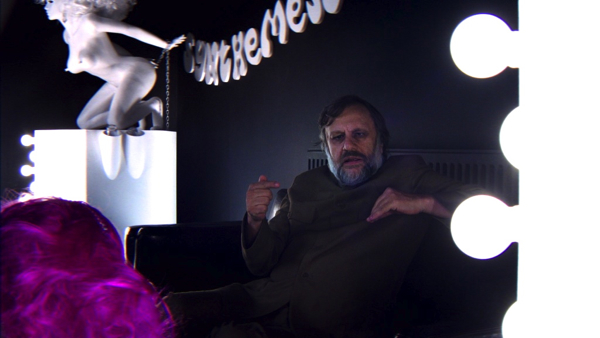Movie review by Greg Carlson
In “The Pervert’s Guide to Ideology,” his infectiously entertaining second collaboration with filmmaker Sophie Fiennes, the Slovenian cultural philosopher Slavoj Zizek expands his shaggy, ursine celebrity as the most accessible and engaging of contemporary Marxist, Lacanian psychoanalytic critics. In essence an illustrated lecture, Fiennes juices Zizek’s talking head performance in the same manner established in “The Pervert’s Guide to Cinema” (2006): by situating her star in detailed recreations of movie sets, from Travis Bickle’s shabby cot in NYC to Alex DeLarge’s catbird perch in the Korova Milk Bar to Jack Dawson’s icy grave in the North Atlantic. The delirious effect brings a series of big ideas to life, colorfully illuminating Zizek’s wide-ranging thoughts on politics, religion, and all things ontological.
At the center of Zizek’s overarching argument about humanity is the notion that people navigate the world with a kind of false consciousness that both allows us to justify all sorts of horrible behavior and obscures from us the “reality” of hegemonic social orders. The guide starts the party with a discussion of the weirdly protracted fight scene between Roddy Piper’s Nada and Keith David’s Armitage in John Carpenter’s “They Live” (1988) – a movie Zizek calls “one of the forgotten masterpieces of the Hollywood left.” Zizek, after noting that he is already “eating from the trash can all the time,” explains the reason for Armitage’s refusal to don the sunglasses that allow one to view the unadulterated messages encoded in the monolith of capitalistic propaganda: to “step out of ideology” is painful.
“The Pervert’s Guide to Ideology” references far fewer movies than the “The Pervert’s Guide to Cinema” (just a little more than half of the total in the earlier film), but the picks include hugely popular texts like “The Sound of Music” (1965) and “Jaws” (1975) as well as material less well known to the American viewing public. The latter category contains Mikheil Chiaureli’s “The Fall of Berlin” (1950) and Jan Nemec’s “Oratorio for Prague” (1968), the short documentary that purportedly captures the only film footage of the Soviet invasion of Czechoslovakia. Occasionally, Zizek also touches on content that calls for supporting imagery from the likes of Coca-Cola commercials, news reports of the shocking terrorist attacks in Norway in 2011, Donald Rumsfeld spewing utter falsehoods on the existence of WMDs in Iraq, and an aviation junkyard in the Mojave Desert stocked with decommissioned jetliners.
The most enjoyable dimension of Zizek’s engagement with cinematic texts is the excitement, glee, and sharp wit that rise up every time the man elucidates a surprise twist or contradiction that turns a previously held notion upside down. Zizek convincingly argues, for example, that Rammstein undermines fascism by performing a burlesque of “pre-ideological” Nazi-influenced gestures, and that “Titanic” (1997) offers a “ridiculous fake sympathy with lower classes” that allows the wealthy and privileged Rose to feed like a vampire on the penniless Jack, who really only functions to reconstitute her ego. Had the ocean liner not collided with the iceberg, Zizek reasons, Jack and Rose would have flamed out after “two, three weeks of intense sex in New York.”
In a similar way, the doctors of Altman’s “MASH” (1970) are not subversive, insubordinate, antiauthoritarian agents in an antiwar satire but instead operate “perfectly as soldiers,” fulfilling their duties with skill and devotion. The same goes for Matthew Modine’s Joker in “Full Metal Jacket” (1987), whose apparent derision and contempt for the rituals of military discipline give way to his training as a killing machine. The viewer receives as much pleasure from these little epiphanies as Zizek does in the telling, and one of the movie’s lessons in irony describes the widespread use of Beethoven’s “Ode to Joy” by totalitarian dictators. The tune – like ideology itself – becomes an empty vessel capable of holding any and every meaning ascribed to it. If, as Zizek maintains, lifting the veil of ideology through critique lets us function outside the narcotic haze to which we acquiesce, I’m ready to enroll in his film class.
